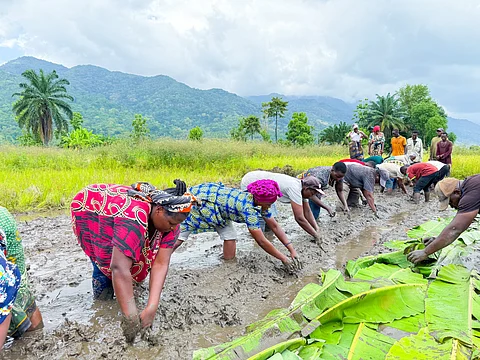

Asha Omary knew something was wrong the last time she stood in her rice field. The plants were stunted, their leaves yellowing under the scorching sun. She had followed every technique she was taught — spacing seedlings, applying compost, managing water — but something was missing.
“For years, we had help,” she said, gripping dry soil. “Experts showed us how to grow more rice without flooding fields, how to stop soil erosion. Now, they’re gone. We are alone.”
Omary, 38, a mother of four, has farmed all her life. Her husband, Juma, helps when he can, but with dwindling yields, he takes odd jobs in Morogoro town, 25 miles away, to keep food on the table.
For five years, USAID-funded experts trained Kiroka farmers on the System of Rice Intensification (SRI), improving yields without constant flooding. They introduced terracing techniques, Fanya Juu and Fanya Chini, to curb erosion on hilly terrain.
“It changed everything,” Omary said. “Less water, more rice.” With each harvest, her yields grew. There was enough to eat and sometimes sell. The family fixed their leaky roof. For the first time, Omary felt hope.
Then, early this year, the support vanished.
The funding cuts came quietly, buried in Washington budget decisions. When the USAID programme ended, so did technical support. Agricultural officers who once visited weekly stopped coming. The demonstration plots were abandoned. The last training session was three weeks ago.
“They didn’t even say goodbye,” Omary said. “We waited, but no one came.”
Without guidance, her rice fields suffer. Pests worsen. Weeds choke seedlings. The Fanya Juu terraces crumble and she no longer knows how to maintain them.
“I tried to remember what they taught me, but it’s not enough,” she said. “I need help. We all do.”
Omary’s struggle is not unique. Across Tanzania, climate-smart agriculture initiatives were lifelines for smallholder farmers facing erratic rainfall and rising temperatures. USAID-funded projects not only increased yields but also helped communities adapt.
However, under a broader restructuring of U.S. foreign aid, Donald Trump’s administration dismantled key USAID climate programmes. Across Tanzania, from Iringa’s maize fields to Manyara’s arid lands, the effects are stark.
In Mwanga, where baobab trees stand like skeletal fingers, Eliza Shayo watches dust swirl over a dried-up irrigation channel. A year ago, water trickled through, feeding her vegetables. Now, the cracked earth tells a different story.
“The water is gone,” Shayo said. “The pipes stopped working. The pumps shut down. Now, we just pray for rain.”
For years, USAID-backed projects built small dams, introduced drought-resistant crops, and helped rural communities manage erratic weather. The Tuhifadhi Maliasili Project worked to restore wildlife corridors. The Mara River Catchment Initiative secured water sources.
Now, water harvesting systems are abandoned. Community training has ceased. Farmers who once had a safety net are at the mercy of the climate.
In Dodoma, where dry winds whip across barren land, Paulo Mwasala surveys his once-thriving farm.
“This land is all I have,” he said. “Without the programme, I don’t know how we’ll survive.”
The Rufiji Basin Climate-Smart Agriculture Programme taught him to harvest rainwater and use efficient irrigation, allowing him to grow beans and millet. But with funding gone, agricultural officers stopped visiting. Promised water storage tanks were never delivered.
Experts warned that without support, food insecurity will worsen.
“The loss of funding is a disaster,” said Lydia Mhoro, a soil scientist at Sokoine University of Agriculture. “Farmers need ongoing training, especially for techniques like SRI and terracing. Without it, yields will drop and food insecurity will rise.”
According to the Tanzania Meteorological Authority, average temperatures have risen by 1.3 degrees Celsius over 60 years. Rainy seasons are shorter and droughts last longer. Farmers lose 30 per cent of their yields annually due to extreme weather.
For Tanzania, where nearly 80 per cent of the population depends on agriculture, the climate crisis is an immediate reality.
Beyond farming, conservation efforts are also at risk.
The Tuhifadhi Maliasili Project worked to restore wildlife corridors between national parks. Without protection, deforestation and human encroachment could accelerate, threatening elephants and black rhinos.
“We were making progress,” said conservationist Godfrey Mrema. “Now, everything is uncertain.”
Meanwhile, the Mara River Catchment Initiative, which ensures water security for 1.2 million people, is struggling. The Mara River, crucial for both human settlements and the Serengeti ecosystem, faces increasing stress.
Amani Nyanda, a local herder, has already seen the effects.
“There’s not enough water,” he said, pointing at the receding riverbank. “If this project stops, there will be fights. People will do anything for water.”
“We’re seeking new funding sources,” said Dotto Benjamin, an official at the Vice President’s Office for Environment. “But many projects depended on long-term support, which is gone.”
The government is turning to the European Union, the World Bank and private investors, but experts fear it won’t be enough. Environmental activists call it a global injustice.
“The countries suffering most from climate change contributed least to it,” said Sarah Kaseko, a climate advocate in Dar es Salaam. “How can the US just walk away?”
For now, Omary keeps planting, keeps hoping. But without help, she knows the soil will keep washing away. And the hunger will return.
Her youngest daughter, Amina, watches her in the fields every morning, just as Omary once watched her own mother.
“If things don’t change, we will starve,” Omary said. “This land is our life. If it fails, so do we.”
For Tanzania and other vulnerable nations, the fight against climate change is far from over. But with fewer resources and dwindling support, the question remains: How much longer can they fight alone?